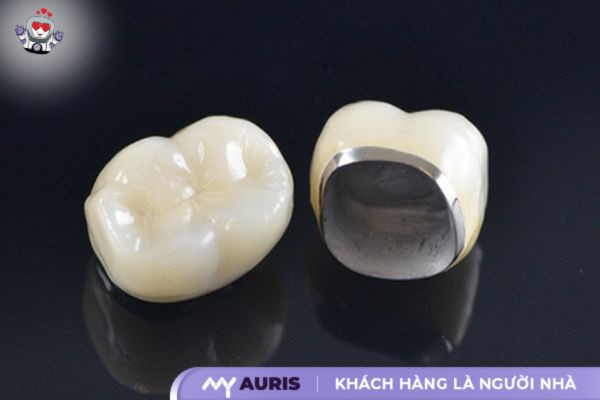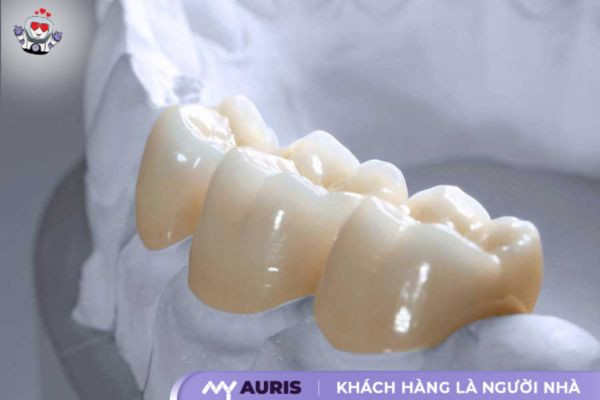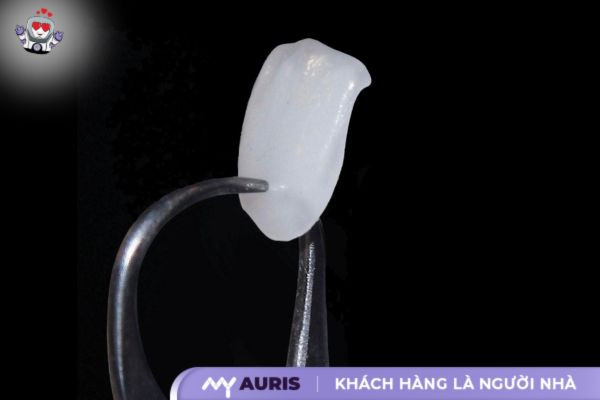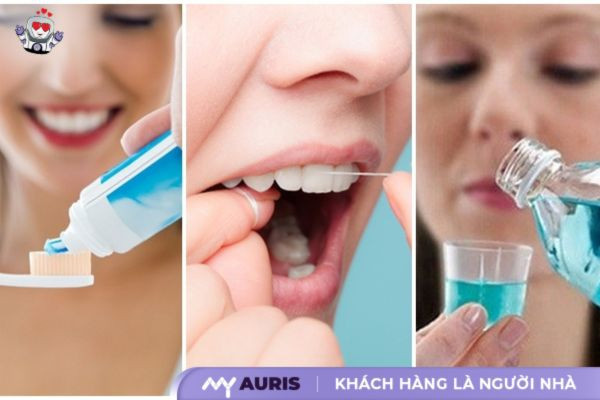How to distinguish popular types of porcelain teeth
All-porcelain teeth are teeth made entirely of porcelain, outstanding with colors like real teeth, beautiful natural, clear, shiny and even compared to the rest of the teeth. The strength of all-ceramic teeth is that they retain their white color when exposed to light, are highly durable, and can last for decades without causing blackening of the gum line or irritation of soft tissue. Meanwhile, metal-ceramic teeth have an inner frame made from highly durable alloys such as Nickel – Chromium, Nickel – Cobalt or Titanium, and the outside is coated with porcelain to increase aesthetics.
Metal-ceramic teeth group type:
Metal ceramic teeth:
Metal ceramic teeth are the most popular type of porcelain teeth, composed of an inner metal frame covered with an outer ceramic layer.
- Advantages: The highlight of metal ceramic teeth lies in the frame made from super durable alloys such as Nickel – Chromium, Nickel – Cobalt, Titanium or even precious metals, ensuring outstanding sturdiness.
- Disadvantages: Unnatural color, easy to blacken gum line after a period of use.

Titanium porcelain teeth:
Titanium porcelain teeth are porcelain teeth made from a titanium frame covered with a ceramic layer on the outside. This is a popular choice for cases where high durability and good corrosion resistance are needed.
- Advantages:Titanium is a very durable metal, has good bearing capacity, helping titanium porcelain teeth have high durability. Titanium is a biological metal that does not cause irritation or allergic reactions in the body.
- Disadvantages: Titanium ceramic teeth have a natural color, but cannot be as bright white as some other types of porcelain.
Precious metal ceramic teeth
Precious metal ceramic teeth are similar like metal porcelain teeth, but the inner frame is made from precious metals such as gold and platinum.
- Advantages: High durability, good chewing resistance, more natural color than metal porcelain teethtype.
- Disadvantages: Cost is higher than metal-ceramic teeth, there is still a possibility of blackening of the gum line.

All-ceramic teeth porcelain
All-ceramic teeth are made entirely from porcelain, without a metal frame. Natural color, no black gum line, high biocompatibility. Below are some popular types of all-ceramic teeth:
Zirconium porcelain teeth
Zirconia porcelain teeth are high-quality all-ceramic teeth, made from high-strength Zirconia material, with good chewing force.
- Advantages: All-ceramic teeth bring many outstanding advantages, from color similar to real teeth, naturally beautiful, clear, shiny and even, to the ability to keep white when exposed to light. This type of tooth is highly durable, lasting decades without causing blackening of the gum line, gaps or soft tissue irritation. In addition, all-ceramic teeth also help prevent bad breath and the restoration process is quick, meeting the needs of aesthetics and oral health.
- Disadvantages: High cost
Emax porcelain teeth
Emax porcelain teeth are all-ceramic teeth made from Lithium Disilicate porcelain, with transparency tall, natural color.
- Advantages: High aesthetics, natural color, high transparency, no black gum line.
- Disadvantages: high cost

Crystal ceramic teeth:
Crystalline porcelain teeth are highly aesthetic thanks to their translucency, long-term stability and good bearing capacity. You can refer to some of the following types of crystal ceramics:
Lucy crystal porcelain teeth
Lucy crystal porcelain teeth, manufactured in the UK by Enlysa, stand out with high hardness, smooth celadon surface and outstanding shine. The outer coating is a layer of pure, natural enamel, providing perfect beauty. Thanks to unique manufacturing techniques, Lucy porcelain teeth bring a luxurious and sophisticated look.
Irisa porcelain teeth
Irisa porcelain teeth (also known as pearl porcelain teeth) are made from rare pearls, outstanding with durability and high aesthetic value, suitable for customers with strict requirements.

Compare the advantages and disadvantages of different types porcelain teeth
When classifying porcelain teeth and choosing the type of tooth, durability, aesthetics, biological compatibility and cost are factors to consider. Metal-ceramic teeth are durable and low-priced, but easily blacken the gum line and are not aesthetically pleasing. All-ceramic porcelain teeth are both beautiful and have good biological compatibility, do not blacken the gum line, but the cost is high. Depending on the condition of the teeth, aesthetic or restorative needs, and budget, choose the appropriate type of porcelain teeth.
Durability
Durability is an important factor. first when choosing porcelain teeth. Porcelain teeth need to be durable enough to withstand chewing forces, ensure chewing function and maintain long-term beauty.
- Metal ceramic teeth: High durability, good chewing ability.
- All-ceramic porcelain teeth: High durability, good chewing resistance, no gum line blackening, natural color, high biological compatibility.
- Crystal ceramic teeth: long-term stability, good bearing capacity, high durability.
Aesthetics
Aesthetics is an important factor for those who want to improve the beauty of their teeth. Porcelain teeth need to have a natural color, without blackening the gum line, creating a natural beauty for the teeth.
- Metal ceramic teeth: Unnatural color, easily blackens the gum line after a period of use.
- All-ceramic porcelain teeth: Natural color, no black gum line, brings natural beauty to teeth.
- Crystal porcelain teeth: Natural, luxurious color, creating natural beauty for teeth.
Birthological compatibility study
Biocompatibility is the compatibility of ceramic tooth material with gum tissue and jaw bone.
- Metal ceramic teeth: Less biocompatibility than all-ceramic teeth, can cause gum irritation.
- All-ceramic porcelain teeth: High biocompatibility, does not irritate the gums.
- Crystal ceramic teeth: High biocompatibility, does not cause gum irritation
Cost
Cost is an important factor when choosing porcelain teeth. The cost of porcelain crowns depends on many factors, including the type of porcelain, the crown technique, and the dentistry performing it.
- Metal ceramic teeth: Lowest cost.
- All-ceramic porcelain teeth: Costs more than metal-ceramic teeth.
- Crystalline porcelain teeth: Highest cost.
Criteria for choosing the right type of porcelain teeth appropriate
To choose the most suitable type of porcelain teeth, you need to consider the following criteria:
Dental condition
Your dental condition affects the choice of porcelain teeth.
- Severely decayed teeth: Root canal treatment may be needed before porcelain crowns.
- Periodontal condition: If you have periodontal disease, periodontal treatment is required before porcelain crowns.
Intended use
The purpose of using porcelain teeth (eg aesthetics, restoration) also affects the choice of porcelain teeth.
- Aesthetics: You should choose porcelain teeth with high aesthetics and natural color.
- Prosthodontics: You should choose porcelain teeth with high durability and good chewing force.
Budget
Your budget is an important factor when choosing porcelain teeth.
- You should choose the type of porcelain teeth that suits your financial ability.
- Talk to your dentist to learn more about the cost of each type of porcelain teeth.
Process of making porcelain teeth
The process of making porcelain teeth includes many careful steps to ensure durability and aesthetics. First, the doctor examines the teeth, takes X-rays and advises on the appropriate type of porcelain teeth. After that, the doctor cleans and grinds the teeth, then takes tooth impressions and sends them to the lab to make porcelain teeth. When the porcelain teeth are completed, the doctor will test-fit them, check the fit, then fix them and adjust them to achieve optimal aesthetics and comfort.
Examination and consultation
The first step is to be examined and consulted by a dentist.
- Check your oral health: The doctor will check your teeth, gums, jawbone, and take X-rays to evaluate your oral health.
- Consultation on the type of porcelain teeth: The doctor will advise you on the types of porcelain teeth that suit your needs, purpose of use and financial ability.
- Answering questions: The doctor will answer all your questions about the process, cost, advantages and disadvantages of each type of porcelain teeth.

Preparation teeth
After examination and consultation, the doctor will prepare the teeth for porcelain crowns.
- Teeth cleaning: The doctor will clean your teeth, removing plaque, tartar and bacteria.
- Tooth grinding:The doctor will grind the teeth to shape the porcelain teeth. The level of tooth grinding depends on the type of porcelain tooth and the condition of your teeth.
- Using anesthetic: The doctor will use anesthetic to reduce pain during the tooth grinding process.
Taking tooth impressions
After preparing the teeth, the doctor will take tooth impressions to create a mold for the porcelain teeth.
- Taking dental impressions: The doctor will use impression material to create a mold for the teeth, helping the porcelain teeth to be made accurately.
- Send tooth impression: The tooth impression will be sent to the lab to make porcelain teeth.
Make porcelain teeth
After receiving the tooth impression, the lab will proceed to make porcelain teeth based on the tooth impression taken.
- Choose material: The material of porcelain teeth will be chosen based on your needs and financial ability.
- Manufacturing porcelain teeth: The lab will use advanced techniques to manufacture porcelain teeth that match the size, shape and color of real teeth.
Tooth attachment Porcelain
After the porcelain teeth are made, the doctor will proceed to attach the porcelain teeth to the position where the teeth have been ground.
- Testing the fit: The doctor will check the fit of the porcelain teeth with real teeth.
- Porcelain tooth attachment: The doctor will use specialized attachment material to attach the porcelain tooth to the position where the tooth has been ground.
- Edit: Doctors can edit porcelain teeth to ensure fit and aesthetics.

Caring for porcelain teeth
Care Porcelain dental care includes daily oral hygiene, a reasonable diet and regular check-ups. To protect your porcelain teeth, you need to brush your teeth at least twice a day with a soft-bristled toothbrush and fluoride toothpaste, and use dental floss and mouthwash to clean your oral cavity. U dietYou should limit hard, sweet and sour foods, while increasing vegetables and drinking lots of water. In addition, you should have regular dental check-ups every 6 months to check the condition of porcelain teeth and detect dental problems early.
Daily oral hygiene
Proper daily oral hygiene is the first and most important step to protect porcelain teeth.
- Brush your teeth properly: You should brush your teeth at least twice a day, morning and evening. Use a soft-bristled toothbrush and toothpaste that contains fluoride. Brush your teeth vertically from the gums down to the roots, not horizontally.
- Use dental floss: Use dental floss every day to clean between teeth, where a toothbrush cannot reach.
- Use mouthwash: Mouthwash helps eliminate bacteria, cleans the oral cavity and creates a fresh feeling. You should choose mouthwash that contains fluoride or chlorhexidine.

Diet
A reasonable diet helps protect porcelain teeth and maintain oral health.
- Limit hard, chewy foods: Avoid eating hard, chewy foods that can easily chip or break porcelain teeth.
- Limit sweets: Sweets can create a favorable environment for bacteria to grow, causing tooth decay and gingivitis.
- Limit sour foods: Acidic foods can erode tooth enamel and damage gums.
- Drink plenty of water: Drinking plenty of water helps keep your mouth clean, eliminating bacteria and leftover food.
- Eat lots of vegetables: Vegetables contain many vitamins and minerals that are good for teeth, helping to enhance gum health.
Re-examination Periodically
Regular follow-up examinations help monitor the condition of porcelain teeth and detect dental problems early.
- Replay frequencyExamination: You should have regular follow-up examinations every 6 months after porcelain crowns.
- Purpose of follow-up examination: Check the condition of porcelain teeth, early detect dental problems, check gingivitis and jaw bone loss.
Choose a reputable dentist to porcelain teeth
To choose a reputable dentist to make porcelain teeth, you can start by finding information online, such as medical websites, reviews on Google and social networks to know more about service quality and customer feedback. Consulting relatives and friends is also an effective way to receive trustworthy recommendations. In addition, checking the doctor’s qualifications and experience is also important; Please consider their qualifications, professional certificates and practical experience in the field of dentistry, then make the appropriate decision for your needs.
Find out information online
The Internet is a rich and convenient source of information to learn about reputable dentists.
- Search for information: You can search for information about reputable dentists on Google, Facebook, reputable medical websites.
- Consider the website: Review the dentist’s website, see if the information about the service, team of doctors, technology, equipment, operating license is complete and transparent.
- Read articles and blogs: Read articles and blogs about dentistry to learn about the professional knowledge, experience and reputation of dentistry.
Read Customer reviews
Customer reviews are a valuable source of information to help you evaluate the quality of dental services.
- Read reviews on Google: Read reviews on Google Maps, Google My Business to see customer opinions about the service, quality, and service attitude of dentistry.
- Read reviews on social networking sites: Read reviews on Facebook, Instagram, and forums to see what customers think about dentistry.
- Check authenticity: Check the authenticity of the reviews, see if the reviews are fake or not.
Consulting with relatives and friends
Consulting with relatives and friends is an effective way to find a reputable dentist.
Learn about the doctor’s qualifications and experience
The doctor’s qualifications and experience are important factors affecting the quality of dental services.
- Check qualifications: Check the doctor’s qualifications and professional certificates.
- Learn about experience: Learn about the doctor’s experience in periodontal treatment and porcelain crowns.
- Skill review: Consider the doctor’s skills, expertise, and workmanship.

In short, distinguishing between types of porcelain teeth is essential so you can make a choice that suits your needs, purpose of use and financial ability. Please consult your dentist for advice on the most suitable type of porcelain teeth. My Auris Dental with a team of experienced doctors, modern equipment, always puts customers’ health first, committed to bringing you effective, safe and aesthetic porcelain crown solutions. Customers are family members – that is the motto of My Auris Dental.
Duong Duong






